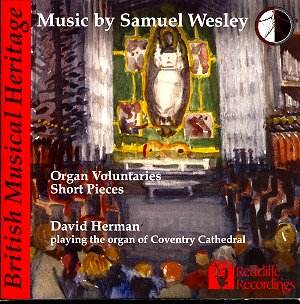Samuel Wesley was an outstanding composer of his time
and most of his characteristic works were written for the organ. The
sincerity of his organ music is evidenced by his enlargement of the
structure of the 18th century Voluntary. He also developed
its expressiveness and transformed the weaknesses of the instrument
of those times into strengths. As the well-written booklet inform us,
by that time the organ had two main limitations. ‘First the absence
of a pedal organ, even if some instruments had pull-down pedals, or
couplers, for the lowest notes; second, the absence of a tonally distinctive
character for the divisions other than the Great. It was essentially
a one-manual instrument, in spite of a second, and occasionally (as
in the Portuguese Embassy Chapel) a third manual.’
Wesley was an enthusiast of Bach’s music, which he
pioneered in England and like him, he was an excellent organist. He
had never been appointed to a church post as organist. Bach’s influence
is quite strong in these works. Their range is not limited to organ
alone but covers a broad spectrum. He wrote music for orchestra, chamber
music, quartets, voice and keyboard.
Wesley composed over 100 works for solo organ. The
Op.6 was composed between 1805 and 1818. The Voluntaries have a sonata-like
dimension and form. They are the ancestors of Mendelssohn’s organ sonatas.
The pieces performed on this CD ‘exploit the nature and soul of the
organ in a way no English composer had done before him.’ By the time
Wesley composed his Op.6 his style was ‘plain; chromaticism of the melodic
line; harmonic subtlety, mastery of contrapuntal techniques, fondness
for theme and variations, use of dotted rhythms, unisons, dramatic contrasts.’
The Twelve Short Pieces are in the form of brief preludes. Wesley took
‘the various tonal aspects of the 18th century instrument
that was available to him, and used them as vehicles for 2-part studies:
Full with the trumpet, cornet, etc. The most striking feature of these
polished, concentrated miniatures is the integrated use of chromaticism.’
Herman’s playing is neat and quite expressive in general.
The registration at the flexible Harrison & Harrison organ is effective
and well managed. What is missing is any real sparkle and momentum.
This would have helped convey the different characters of the sections.
His playing is a little too matter of fact. Some sections are less musically
cohesive and the phrasing needed to feel a little more expansive. Occasionally
the bass line is not clear enough and with the heavy pedal registration
the sound creaks. This is something that the recording technician could
have moderated. The ornamentation is could have done with being crisper,
freer and more expressive.
Christina Antoniadou
Notes
on this recording
Redcliffe
Recordings


![]() David Herman (Organ)
David Herman (Organ)
![]() REDCLIFFE RECORDINGS
RR019 [57.55]
REDCLIFFE RECORDINGS
RR019 [57.55]